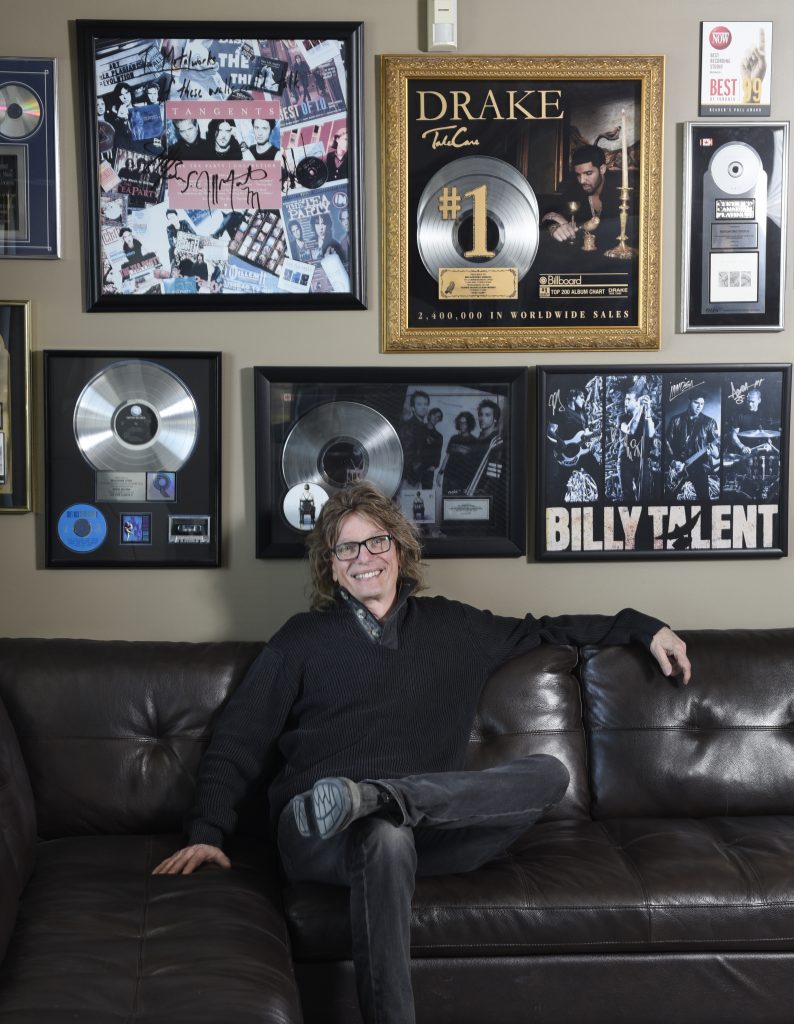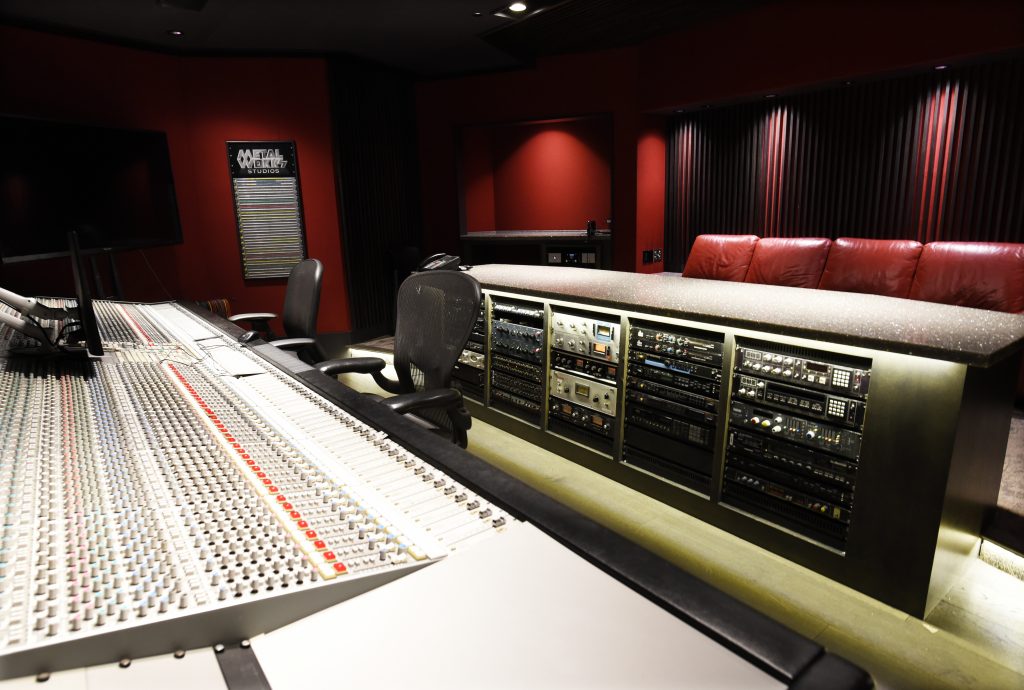By Rebecca Dumais / Archival Triumph photos provided by Metalworks Studios |
Laying a New Music Project Online
As soon as you mention the band Triumph or mention the name Gil Moore in conversation, your favourite Triumph track probably starts playing in your head – or you belt out a few lines like you would in the shower or the car.

Gil Moore is a Mississauga-based musician who has been active in the Canadian music industry for over 40 years. Gil is a founding member of Triumph, one of Canada’s most celebrated music groups. He’s also the CEO and Founder of Mississauga’s Metalworks Studios, Metalworks Institute, and Metalworks Production Group.
 A quick Wikipedia query illustrates just how much the band – and Gil individually – have been lauded with awards and honours for their contributions to the industry. Among the list includes their induction into the Canadian Music Hall of Fame (2008), the Q107 Toronto Music Hall of Fame (1997), the Canadian Music & Broadcast Industry Hall of Fame (2007), Mississauga’s Legends Row (2012), and Canada’s Walk of Fame (2019).
A quick Wikipedia query illustrates just how much the band – and Gil individually – have been lauded with awards and honours for their contributions to the industry. Among the list includes their induction into the Canadian Music Hall of Fame (2008), the Q107 Toronto Music Hall of Fame (1997), the Canadian Music & Broadcast Industry Hall of Fame (2007), Mississauga’s Legends Row (2012), and Canada’s Walk of Fame (2019).
Triumph’s 14 albums have received 25 Gold and Platinum certifications from Music Canada and RIAA in Canada and the United States respectively.
Metalworks Studios, Canada’s most celebrated music studio, has nearly 200 gold and platinum Music Canada and RIAA awards. Numerous artists, including Drake, Katy Perry, Jonas Brothers, Prince, Tina Turner, David Bowie, The Cranberries, Guns N Roses, Bruce Springsteen and N’SYNC have become part of the Metalworks legend. Movie stars such as Richard Gere Renee Zellweger and Catherine Zeta-Jones have also graced its halls.
In 2019, Metalworks Studios won the Canadian Music Week CMW “Recording Studio of the Year” award (2019) for an unprecedented 17th time, a record that will likely never be broken.
 Launched by the studio, Metalworks Production Group extended the studio’s services into education and the live event field. Today, Metalworks Institute has over 250 full-time students enrolled into its music education program.
Launched by the studio, Metalworks Production Group extended the studio’s services into education and the live event field. Today, Metalworks Institute has over 250 full-time students enrolled into its music education program.
Gil’s newest project is SoundsUnite. The goal will be to take AI-powered music education to every student in Canada – elementary, high school and university-aged learners and also to disadvantaged school-aged youth. “It’s an attempt to make music education (available) like water or air,” he says.
Canadian students can experience SoundsUnite for free through foundational support and those outside of education can sign up for any of the three membership tiers. Gil has made this “freemium” offer to Canadian students “One hundred per cent because I’m a Canadian,” he says. It’s also important to him that it be recognized as a Canadian creation. Release for the app is set for this May, media launch is set for September 2023 and its global launch will be in 2024.
Gil firmly believes that SoundsUnite will help traditional education, not only through “the altruistic aspect of sharing good information, but also by inspiring young learners, otherwise they fall off the radar and get discouraged – that’s what happened to me in school,” he says. “We’re going to be live very soon and we’ve been very fortunate to have Microsoft and RBCxMusic as believers from day one.”
Other early supporters of SoundsUnite include Alex Lifeson and Tom Cochrane. Gordon Lightfoot penned a letter of support. “We haven’t reached out extensively to the artist community yet, but we will. I know we’re going to get broad-based support because I don’t know a professional musician, frankly, that wouldn’t agree with me.”
Students can access an expanding collection of lessons taught by industry professionals, access sound samples, instruments and effects, and use a multi-platform digital audio workstation to capture ideas and create songs and sounds anywhere at any time. “I’d like to feel that at the end of the day, SoundsUnite helped different genres collaborate,” he says. The future George Harrisons wouldn’t need to get on a plane to meet the Ravi Shankar’s of the world. “The next union of that sort will be over SoundsUnite.”
When the app gets fully built out the Artist Services component gives guidance on the monetization and business side – those principles of the business that he says are like the cod liver oil of music. “You need it, you should take it, but it doesn’t taste good,” he laughs.
There are a lot of horror stories of musicians getting ripped off – the era Gil says he grew up in. “I’m not saying that happened to me, my dad was a good businessman and he warned me to pay attention to what’s going on – don’t think certain details will look after themselves because they won’t,” Gil says. “He was right. He gave me a good background on how to not end up like so many of the sad stories that we’ve heard.”
Sure, he says being in a band was fun – just look at their videos. But Gil points out the serious side. “I always took my music career seriously. I wanted to know that our contracts were signed correctly, that everyone that was working for us was getting paid, and we were getting paid as well – just the fundamentals of business,” he explains. “I’m glad I did because otherwise there would never have been a Metalworks Studios or school – none of this. It’s all from the fundamentals that I learned from my father. Hopefully, we’ll be teaching some of those fundamentals through SoundsUnite.”
Anyone who loves music can’t deny its power. “As far as the education of music – it has a magic component that mathematics doesn’t have,” Gil says. “I’m a drummer. I love math. That’s a joke,” he laughs. “Math is challenging but not necessarily fun, but it’s something you need to know. Yet most people find music fun, and fun is good. Keeping people happy makes them accept that challenge (of learning) and moving forward.”

Did Gil’s experience as a drums-obsessed teenager form how the app was developed? “In music instrument playing, yes,” he says. “When I started playing, I don’t know that you could have gotten drum lessons even if you wanted them. It was figure-it-out-for-yourself time.”
As an avid fan with a laser focus on the drummers of his favourite bands, he was eventually able to get a few impromptu lessons from them. A good drum instructor, according to Gil, needs to start with not only the basics but get a student to move up the ladder more quickly if they show them what the results are when it comes to drumming speed. “They can take something that sounds very pedestrian but when it finally sounds like a machine gun burst, then it’s inspiring. You can slow down the drums until it’s in bits and pieces and you watch how it’s assembled, like watching a stone mason assemble a brick wall.”
The app will also have an AI layer built in that will act as a guidance tool to help students progress and suggest what modules should be done next. “That’s what we’re hoping to do with our friends at Microsoft; to build out the AI layer,” he says.
From the beginning of Gil’s career to the present, what’s been the most meaningful? “This,” he says referring to SoundsUnite. It’s a way to pass on his school and studio’s legacy to the next generation. “I never thought back then that we would get beyond a campus school, which I love, and now this (the app) becomes a worldwide school if we’re successful. It will take into account youth at risk and people that are outside of education that should be inside education. If they’re in school, great, they get (SoundsUnite) this is an adjunct to their campus school. If they’re not, this could be their school, at least in music.”
 Canada punches beyond its weight class in music. “It’s a statistic that’s easy to verify,” Gil says. “You look at right now some of the artists that have really moved the needle, like Drake, The Weekend, Justin Bieber – some of these artists that have made a major impact on the world music scene. Tom Cochrane and I have talked about this; why are Canadians seemingly very good at creative skills in music? The theory that we reached is, it’s kind of the northern climate and the Celtic influence. Tom theory is that a lot of times in the winter people do indoor activities – what better to do than to play music? That kind of sparks the seed versus a warmer climate where the outdoors is beckoning. I have no proof, but I kind of accept it.”
Canada punches beyond its weight class in music. “It’s a statistic that’s easy to verify,” Gil says. “You look at right now some of the artists that have really moved the needle, like Drake, The Weekend, Justin Bieber – some of these artists that have made a major impact on the world music scene. Tom Cochrane and I have talked about this; why are Canadians seemingly very good at creative skills in music? The theory that we reached is, it’s kind of the northern climate and the Celtic influence. Tom theory is that a lot of times in the winter people do indoor activities – what better to do than to play music? That kind of sparks the seed versus a warmer climate where the outdoors is beckoning. I have no proof, but I kind of accept it.”
Getting people involved in music in one way or another (as a songwriter, lyricist or playing an instrument) is a good thing. It “can do nothing but help societies everywhere,” he says. “We’re really proud of it. It’s an attempt to create a worldwide classroom; a community of learners of all different cultures and musical genres and allow them to share music in the cloud that they can edit and get the education that they would not otherwise be able to afford.”
Watch for updates on Soundsunite.com or contact via Metalworksstudios.com

